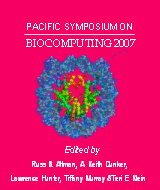Chalkboard: Ontology-Based Pathway Modeling And Qualitative Inference Of Disease Mechanisms
Cook DL, Wiley JC, Gennari JH
Physiology/Biophysics, Comparative Medicine, Biomedical & Health Informatics,
University of Washington, Seattle, WA, 98195, USA
Pac Symp Biocomput. 2007;:16-27.

Abstract
We introduce Chalkboard, a prototype tool for representing and displaying cell-signaling pathway knowledge, for carrying out simple qualitative reasoning over these pathways, and for generating quantitative biosimulation code. The design of Chalkboard has been driven by the need to quickly model and visualize alternative hypotheses about uncertain pathway knowledge. Chalkboard allows the biologists to test in silico the implications of various hypotheses. To fulfill this need, chalkboard includes (1) a rich ontology of pathway entities and interactions, which is ultimately informed by the basic chemistry and physics among molecules, and (2) a form of qualitative reasoning that computes causal chains and feedback loops within the network of entities and reactions. We demonstrate Chalkboardís capabilities in the domain of APP proteolysis, a pathway that plays a key role in the pathogenesis of Alzheimerís disease. In this pathway (as is common), information is incomplete and parts of the pathways are conjectural, rather than experimentally verified. With Chalkboard, we can carry out in silico perturbation experiments and explore the consequences of different conjectural connections and relationships in the network. We believe that pathway reasoning capabilities and in silico experiments will become a critical component of the hypothesis generation phase of modern biological research.
[Full-Text PDF] [PSB Home Page]